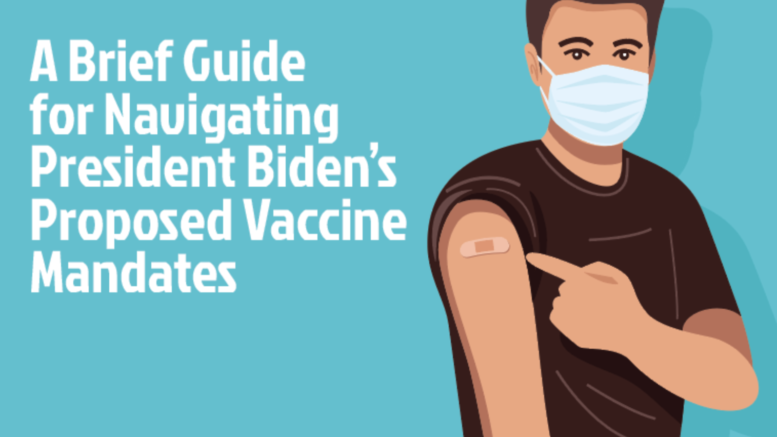On September 9, 2021, President Biden announced that private employers with more than 100 employees will be required to either mandate vaccines or conduct weekly COVID-19 testing, while government employees and employees of government contractors will be required to get vaccinated, with no option for regular testing in lieu of vaccination. The policies, if adopted, are expected to impact more than 100 million workers, or two-thirds of the country’s workforce.
The rule came from the Occupational Safety and Health Administration (OSHA) in the form of an Emergency Temporary Standard (ETS), which allows the agency to enact regulations that are immediately enforceable if a “grave danger” to worker safety is present. The ETS was published in the Federal Register on November 5, 2021, and was set to go into effect on January 4, 2022.
However, the constitutional and legal enforceability of the vaccine mandate remains uncertain. Since the ETS was published, approximately 27 states, as well as businesses and political action groups, have challenged the mandate by filing lawsuits in federal courts across the country. On November 6, 2021, the 5th U.S. Circuit Court of Appeals blocked the mandate and OSHA subsequently announced that it was suspending enforcement of the vaccine mandate pending future developments in litigation. Soon thereafter, each of the legal challenges filed across the country were consolidated into one case, which is now pending in the 6th U.S. Circuit Court of Appeals. The Biden administration will now ask the 6th Circuit to set aside the order from the 5th Circuit and allow the vaccine requirement. Whether the vaccine mandate is constitutionally and legally enforceable is a question that is expected to make its way up to the U.S. Supreme Court.
With no clear end in sight, contractors should continue to closely monitor the status of the ETS to avoid potential legal and pecuniary liability. All employers covered by the OSH Act must comply with the ETS if it goes into effect. Covered employers who ignore or otherwise fail to comply with the standard could face OSHA citations and penalties up to $14,000 per violation, or ten times that for a willful or repeated violation. The ETS would have immediate effect in the 29 states where federal OSHA has jurisdiction. In the remaining states not covered by federal OSHA jurisdiction over the workplace (e.g., California, Tennessee, North Carolina, and Kentucky), the OSHA-state-plan states must adopt the ETS or measures that are just as effective as the ETS within 15 to 30 days. Again, contractors should determine whether they fall under federal or state OSHA jurisdiction and continue to closely monitor whatever measures are adopted.
Private Employers
In light of the ETS, employers all over the country have expressed concerns and questions about what to expect if and when the ETS goes into effect, such as:
• How do you determine whether an employer has more than 100 employees? Labor Department officials have confirmed that the 100-employee threshold will be counted on a company-wide basis, not per location. Other questions surrounding the 100-employee threshold include whether subcontractors or independent contractors are considered employees for determining whether the ETS is applicable to an employer. Contractors should pay careful attention to the ETS for guidance when utilizing subcontractors and independent contractor to avoid potential liability.
• Will remote employees be covered? Labor Department officials also confirmed that remote workers not working in contact with others would not be covered by the emergency rule provided those workers do not come to the workplace.
• Will employers be required to collect proof of vaccination? OSHA currently requires employers to retain, preserve, and maintain employee medical records for the duration of the employment plus an additional 30 years. Labor Department officials have stated that information regarding collection and verification of vaccination status will be outlined in detail in the ETS. If the ETS does require employers to collect proof of vaccination, employers may be required to maintain that record for the duration of the employee’s employment plus 30 years.
• Who will pay for the weekly testing of unvaccinated employees? Generally, any testing protocols must abide by applicable wage and hour laws, which provide that time spent on receiving employer-mandated tests are typically treated as compensable. The Labor Department’s COVID-19 and the Fair Labor Standards Act (FLSA) Questions and Answers, published before President Biden’s plan was announced, provides that employers are required to pay employees for time spent waiting for and receiving medical attention — including COVID-19 testing — at their direction or on their premises during regular working hours under the FLSA. This likely includes required testing occurring on employees’ days off if such testing is necessary to perform their jobs safely and effectively during the pandemic. While insurance may cover the cost of the tests, several states around the country already require employers to pay for mandatory medical tests or reimburse employees for any such testing. Details concerning who will bear the costs of testing will be contained in the ETS.
While OSHA works through the rule-making process, governors from several states have already announced their intent to challenge the legality of the mandate as applied to private employers.
Federal Employees, Contractors and Subcontractors
Although OSHA has not formally issued the ETS governing private employers, the Safer Federal Workforce Task Force has already issued new Workplace Safety Guidance for Federal Contractors and Subcontractors, which provides further detail and guidance on the vaccine mandate and COVID-19 safety protocols affecting nearly all federal contractors.
In addition to the mandatory inclusion of a flow-down clause requiring compliance with the guidance, the guidance imposes three requirements:
- A vaccine mandate requiring full vaccination for employees of covered federal contractors by December 8, 2021, with limited exceptions for those legally entitled to an accommodation (prior COVID-19 infection or antibody tests are not accepted substitutes under the new guidance).
- Mask and physical distancing requirement at covered contractor worksites (including for employees, visitors, and others).
- A requirement that contractors designate a person or persons to coordinate COVID-19 workplace safety efforts at their workplaces.
Notably, not all federal contracts will be covered. In order to be covered under the federal contractor vaccine guidance, the contract in question (or a “contract-like” instrument that is not a grant) must be performed in the United States, in whole or in part, and must be a procurement contract for construction covered by the Davis Bacon Act (DBA), contract for services under the Service Contract Act (SCA), concessions contract under the SCA, or contract in connection with federal contracts or land offering services to federal employees, their dependents, or the general public.
All covered federal contractor employees, including those who previously had COVID-19 and including those who work outside or work remotely, must be fully vaccinated by December 8, 2021, unless the employee is legally entitled to an accommodation for a disability (including medical conditions) or sincerely held religious belief, practice, or observance. After December 8, covered employees must be fully vaccinated by the first day of the period of performance on a newly awarded covered contract, and by the first day of the period of performance on an exercised option or extended or renewed contract when the clause has been incorporated into the covered contract.
Covered contractors must also verify an employee’s vaccination status by obtaining proof and cannot document an employee’s vaccination status through self-attestation. Covered contractors must require covered contractor employees to show or provide one of the following:
- A copy of the record of immunization from a health care provider or pharmacy.
- A copy of the COVID-19 Vaccination Record Card.
- A copy of medical records documenting the vaccination.
- A copy of immunization records from a public health or State immunization information system.
- A copy of any other official documentation verifying vaccination with information on the vaccine name, date(s) of administration, and the name of the health care professional or clinic site administering the vaccine.
As the world continues to face unprecedented times in the wake of COVID-19, private employers and employees, and federal employees, contractors, and subcontractors should carefully follow applicable regulations and guidelines regarding President Biden’s new vaccine mandates. Employers are encouraged to seek legal advice from a qualified attorney to ensure compliance with the already adopted federal guidelines, fully prepare for the forthcoming ETS, or in the event of a purported OSHA violation.
Author’s note: This article is intended only for informational purposes and should not be construed as legal advice.
About the author: Keith A. Boyette is an attorney with Anderson Jones, PLLC, a construction law firm located in Raleigh, North Carolina, with attorneys licensed in North Carolina, South Carolina, and Georgia. He assists clients throughout the litigation process, from pre-filing advice to mediation, settlement negotiations and trial. For more information or questions about this article, please email Keith at [email protected].




Be the first to comment on "A Brief Guide for Navigating President Biden’s Proposed Vaccine Mandates"